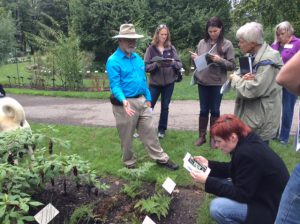
On October 1, the MSU College of Veterinary Medicine hosted the Third Annual Small Ruminant Health Symposium. Approximately 175 participants attended, either in-person or on-line to attend a variety of seminars and labs.
Dr. Ray Kaplan gave his Keynote presentation Sustainable Integrated Parasite Management for Small Ruminants: These Ain’t Your Father’s Parasites. He also presented a lab called Parasitic Life Cycles and Fecal Egg Counting. Additional morning seminars included Dr. Almudena Veiga-Lopez presenting Sheep as Models for Developmental Origins of Health and Disease (DOHaD) Studies and Dr. Richard Ehrhardt presenting New Diagnostic Tools to Detect and Differentiate Between Benign and Virulent Strains of Dichelobacter Nodosus, the Causative Agent of Foot Rot in Sheep.
After morning sessions, on-site participants attended a catered lunch with “topic tables” for networking. Lunch topics included Fiber, Dairy Goats and Sheep, Niche Meat–Sheep and Goats, Commercial Meat–Sheep and Goats, Camelids–Llamas and Alpacas, and Toxic Plants. After lunch, participants chose two of three labs to attend: Parasitic Life Cycles and Fecal Egg Counting with Dr. Ray Kaplan, Necropsy with Dr. Dalen Agnew, or Toxic Plants of Small Ruminants with Dr. Peter Carrington.
The Symposium ended with a panel for participants’ questions and answers and a catered reception. The College thanks the Stucki Family Foundation, which helped support the Symposium this year. Additionally, the 2016 Committee included Dr. Dalen Agnew, Dr. James Averill, Dr. Richard Ehrhardt, Dr. Dan Grooms, Matthew Koss, Kristine Kounelis, Dr. Janver Krehbiel, Dr. Judy Marteniuk, Mike Metzger, Dr. Erin Recktenwald, and Marie Seddon.
